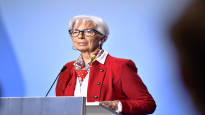The Council of the European Central Bank meets again in an exceptionally difficult economic situation. The Council is expected to raise the interest rate by no more than half a percentage point.
FRANKFURT The European Central Bank’s options are few and far between today, Thursday, when its top management decides on interest rate policy.
According to the latest data, the economy of the euro area is barely growing. At the same time, inflation has remained stubbornly high even in the spring.
In practice, the ECB therefore has no other choice than to tighten the money screw for households and companies in order to tame prices, i.e. to raise interest rates. At the March meeting, it already raised the deposit rate to three percent.
People with housing debt in particular have felt the war in Ukraine and the subsequent rise in fuel prices in their wallets throughout the spring. There is no relief in sight yet.
The most common, i.e. 12-month Euribor, is already at 3.84 percent. The central bank does not directly decide on the level of the most common mortgage reference interest rate, i.e. the 12-month Euribor, but the increase in the reference interest rates and expectations of the central bank’s movements are reflected in it.
With the calculator at the end of the story, you can test how your loan’s maintenance costs change as interest rates rise.
More rate hikes in the summer
Analysts and economists who follow monetary policy estimate that key interest rates will rise this time by perhaps 0.25 but no more than 0.5 percentage points.
The peak would be reached, for example Bloomberg’s analyst panel (you will go to another service) included in July. In autumn, the ECB would start lowering interest rates again.
The ECB’s 26-member council is very divided on interest rate hikes, as there are representatives from the central banks of the 20 euro countries. Finland is represented by the Governor of the Bank of Finland Olli Rehn.
– The hawks will attack the pigeons fiercely on Thursday, OP’s chief economist Reijo Heiskanen wrote on Twitter under the meeting.
The meltdowns only get dusty when fighting over whether the interest rate will rise by 0.25 or 0.5 percentage points, he said.
In central bank slang, those who push for a clear tightening of monetary policy are called hawks. Doves, on the other hand, are those who no longer want to raise interest rates very much.
Among the large countries, the economies of France and Italy have returned to growth, while Germany is experiencing major difficulties. On the other hand, the rise in consumer prices has accelerated in France and Spain, while inflation is already easing in Germany.
The entire euro area economy grew by only 0.1 percent in the first three months of the year.
People’s purchasing power is weakening
At the same time, domestic consumption weakened in many countries. It shows that rising consumer prices and declining purchasing power are taking their toll.
The central bank now also pays more attention to company profits than before. They use inflation talk to their advantage and raise prices unnecessarily.
According to the ECB (you switch to another service) the profit margins of companies – net income calculated as a percentage of turnover – were 8.5 percent in March, while still under the Russian war of aggression, at the end of 2019, they were only 7.2 percent.
More on the topic:
